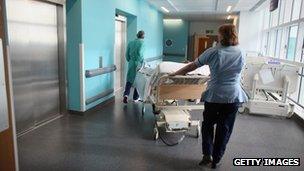'No NHS pay freeze' in Scotland
- Published

The Department of Health at Westminster says a pay rise would put further pressure on NHS budgets
The Scottish government has pledged not to impose a pay freeze on NHS workers in Scotland.
It came after the Department of Health (DoH) at Westminster urged UK-wide pay review bodies to cancel a planned 1% pay rise next year.
It said the rise was unaffordable and the money should instead be used to help maintain safe staffing levels.
But Scottish Health Minister Alex Neil said he had "no intention" of withholding the rise in Scotland.
He said the Scottish government had made its own proposals to the pay review bodies, proposing that the 1% rise is implemented in 2014/15 as well as giving further help to those on low wages by ensuring no one employed by the health service earns less than the Scottish Living Wage.
Mr Neil accused Westminster counterpart Jeremy Hunt of "bad faith" and said withholding the pay rise would be a "betrayal of the NHS".
He added: "To steal the pay rise back from workers' hands will destabilise the NHS across the UK and damage morale.
"The Scottish government has no intention of following Jeremy Hunt and we will use our independence over the health service to block this move.
"But with UK wide agreement to Agenda for Change - which established pay policy in the health service - this damaging right wing approach could hit Scottish services, and under the current funding settlement could drive down Scotland's budget in the future.
"My message to Hunt is unequivocal - Scotland rejects your politics, your attack on staff, and your desire to destroy the real NHS."
The health secretary said he would be meeting with unions "to ensure this ludicrous proposal finds no foundation in Scotland."
On Saturday it emerged the DoH had made a written submission to the NHS Pay Review Body, external in which it said the proposed 1% rise was unaffordable alongside the current system, which sees many staff automatically receive incremental annual rises.
Motivation and morale
The move has been criticised by Labour and the unions.
The DoH has stressed no decisions on changes to pay have been taken, and said independent bodies will make their recommendations in February or March next year.
However, in its submission, the DoH pointed to a staff survey suggesting high levels of motivation and morale, and said there should only be basic pay increases if there is "strong evidence" recruitment, retention, morale or motivation issues require this.
The submission said: "Employers cannot pay staff more, improve quality and productivity and protect jobs.
"Careful and prudent management of the NHS pay bill is critical if we are to maintain the right number of frontline staff with the right skills. We believe more affordable employment contracts can help deliver better care and improve job security."
The NHS Pay Review Body makes recommendations on the remuneration of all staff paid under Agenda for Change and employed in the NHS.
Its recommendations apply to about 1.5 million staff in NHS Scotland, England, Wales and Northern Ireland, with the exception of doctors, dentists and very senior managers.
It reports separately to the health ministers in each country of the UK, who can accept, reject or modify its recommendation.
- Published5 October 2013